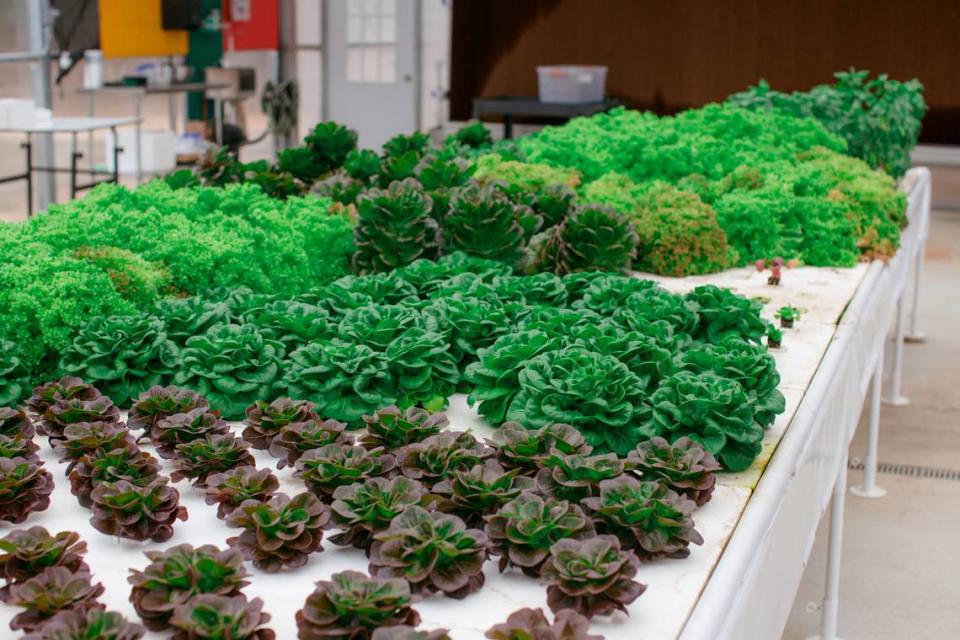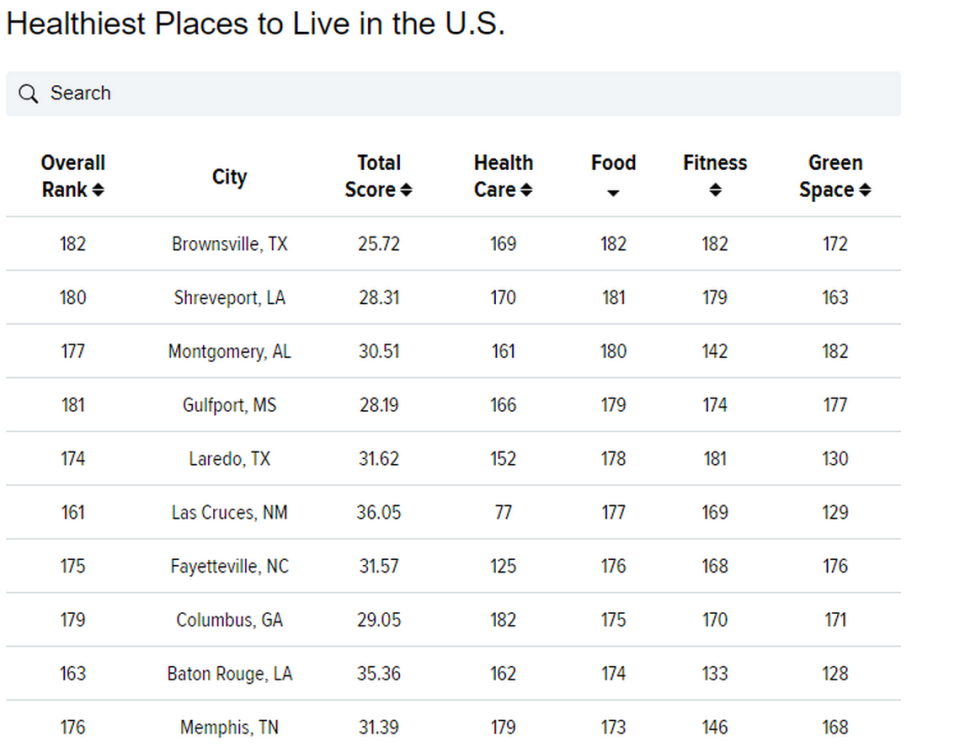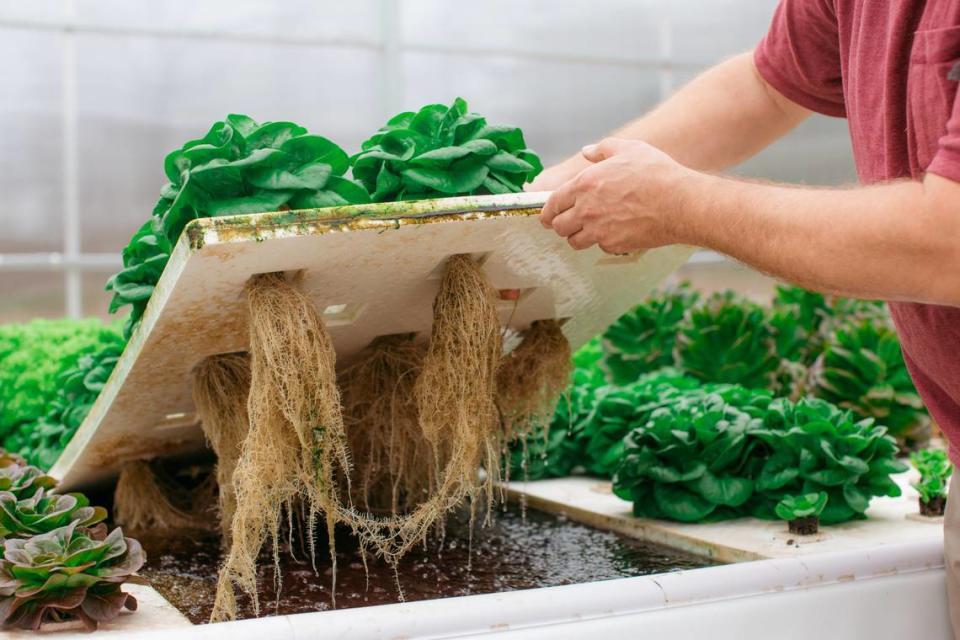Columbus Uptown Market shoppers are asking for more local produce. Can it deliver?
The number one request that Uptown Columbus Inc. receives from Market Days goers is more produce and farm vendors.
And while the Saturday market attracts some 70-100 vendors from April to November, only a handful are produce vendors.
Exacerbating the problem is that the number has continued to dwindle in recent years. Meanwhile, Atlanta and other cities like Athens are seeing the customer and farm base grow, leaving the market in a quandary of how to deliver the goods.
“We’re hoping to expand that number this season, that is our main concern every year,” Hannah Patchin, event and content coordinator for Always Uptown said. “I would love to have 20-30 produce vendors out there. That’s our goal to work that number back up.”
The reasons are myriad, according to farmers. For one, a lack of growers in this region of the Southeast limits the options.
Secondly, there’s been a shift in how farmers sell their produce. Finally, there’s a lack of consistent, dedicated produce-buying foot traffic, making all three challenges a big part of why Market Days seem to be in triage when it comes to fresh produce at the market.
Small-scale farmers and the environment
Smaller farms that don’t rely on industrial methodologies are healthier. Growers typically steer away from using chemicals like pesticides or fertilizers that are harmful to humans and the environment. Having access to produce that enables a plant-rich diet is healthier for people and better for the planet, experts agree.
Carbon dioxide (CO2) emissions from most plant-based products are as much as 10-50 times lower than animal-based products, according to a study by Our World in Data.

The need for fresh, accessible produce, has never been greater, based on a recent report.
Last year, Columbus, Georgia was ranked the 3rd most unhealthy city (179 out of 182 cities studied)in the U.S. In the sub-category of “food”, it was ranked 8th least healthy. Researchers used metrics like inadequate fruit and vegetable consumption, farmers market per capita, healthy restaurants per capita, limited access to healthy food (grocery store proximity), and several other food metrics that can be seen here.

For those who live in Downtown Columbus, the closest grocery store is a 30-minute walk to Piggly Wiggly. For those Downtown residents, it’s also a 15-minute drive to Walmart, Fresh Market, or Publix.
Logistics are even worse for those living in South Columbus where there are just a few grocery stores that offer produce.
“There isn’t a grocery store downtown, so Market Days can help fill that gap,” Patchin said.
Prior to COVID-19 the decades-old Market Days used to be year-round, but there aren’t enough consistent shoppers or growers in the winter months so Uptown Columbus Inc. decided to keep it seasonal.
What Growers Want
Jenny Jack Farm in Pine Mountain used to make the 45-minute trek down to Columbus to sell a diverse bounty of produce at Market Days from 2009 until 2019. Jenny Jackson said customer accessibility from events and the different types of vendors made selling difficult.
“If there was a parade or other events downtown, it cut off access for folks to drive to get close to us,” Jackson said. “It would be a big hit on sales when events went on.” Jackson added that a lack of producer-only regulation made it feel more like a flea market. “Our customers had to wade through a lot of stuff to get to food.”
Jenny Jack Farm also started a Community Supported Agriculture (CSA) subscription program that has customers committing to a bi-weekly seasonal bag of food.
“Market Days was a great place for us to start,” she said. “We met a lot of great customers that we still grow for today.”
Just outside of the eastern borders of Fort Moore, Charity Raven and her partner are growing lettuce in a greenhouse using a method called aquaponics (it is grown in water that is also home to fish) and they grow other produce in a traditional greenhouse at Blackbird farms. The Atlanta-based farmers transplanted to Columbus after the pandemic.
They’ve never gone to Uptown Market days, and instead travel to Atlanta Thursday and Saturday every week to sell to restaurants and the (year-round) Oakhurst Farmers Market in Decatur. Blackbird Farms is planning on signing up for the Midland farmers market this summer when it begins in April.
“We have to be very strategic in the markets we participate in,” Raven said. “I’ve got to come out of a market selling a certain amount. It can’t be a $200-dollar day, it has to be a $2,000-dollar day.”

To some, it may seem surprising that an urban metropolis like Atlanta would have more support and interest than somewhere surrounded by rural areas in Columbus.
“I could throw a penny and hit a farmer every 15 feet in Atlanta,” Raven said. “There are urban plots that contribute to the market. They are everywhere up there.”
Jenny Jack Farm also sells to Atlanta.
“What we sold in Columbus was nothing like what we could do in Atlanta,” said. “There are so many conscious consumers in Atlanta looking for the produce and they are willing to pay the premium price that we have to charge to grow without chemicals.”
Henry Carswell has been the on-site Uptown Market Days manager for 13 years. He keeps track of the vendors ensuring they are in the correct spots and there are no problems from the 9 am-12 pm market. But he said he can’t help but notice how the foot traffic has decreased.
The Food Mill, a vegetarian-friendly cafe and year-round indoor produce shop has been a success when it comes to uplifting local farmers and supplying healthy, non-chemically treated produce. Anna Sims, Director of Marketing and Communications for the Food Mill has observed a few trends over the years.
“Farms have to think creatively about how to serve customers,” Sims said. “A lot of farms have transitioned out of general markets. Farmers markets can be a huge labor and time cost.”
Jenny Jacks, for example, does its drop-offs but once a week invites people to come pick up produce. Blackbird farms offers tours, invites people to come by on the weekends (when they aren’t in Atlanta) and works with locals for deliveries on Wednesdays.
The Food Mill has managed to sustain nearly a dozen produce farms (including Jenny Jack) despite this area not being a “mecca for farming”, according to Sims.
“There really are not a lot of small-scale farms, so working really hard to maintain good relationships with the farmers we work with is important,” she said.
The 2024 Market Season
Angela Graves owns Sandy Creek Acres Farm, an hours drive from Columbus in Taylor County. Last year, Graves and her daughter switched from the Midland market to Uptown Market Days because of the guaranteed spot they could acquire for the season.
The Midland market has a last-minute sign-on set up. Sandy Creek successfully sold candles, eggs, pet treats and do not use pesticides or chemicals. She plans to return this season and add herbs, loofah sponges, and eventually pumpkins and squash (late summer) to her farm stand.
“We are trying to make this a full-time job,” Graves said.
Grave noticed last year how many customers were asking for produce and establishing a relationship with growers.
“I found people, including egg customers are so becoming attuned to their health and what goes in the foods,” she said. “The farmers market [Market Days] seems to be the one place where you can speak with who grows the food.”
Jackson of Jenny Jack’s farm noted that Columbus makes up about 90 of their weekly CSA members, while La Grange, Auburn, and Pine Mountain make up the other 115.
“It’s always been surprising to us that a city as big as Columbus does not have a consumer demand for organic produce,” Jackson said.
Sandy Creek Farm, Hudson Farms, Johnson’s Agriculture, Brave Little Farm, and Charlies Blueberries are the five farms that have signed up for the 2024 season. Charlies Blueberries is only there for the first few months due to the blueberry season ending in the middle of the summer.
Uptown Columbus Inc. (Always Uptown) is currently accepting applications for the 2024 season until mid-March. The cost is a one-time $200 payment.

